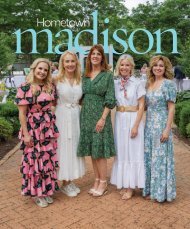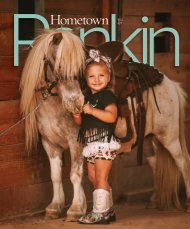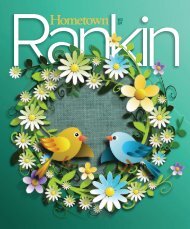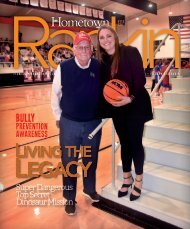Create successful ePaper yourself
Turn your PDF publications into a flip-book with our unique Google optimized e-Paper software.
Scott and April Selman found a new calling when they discovered<br />
the great needs of foster care in Mississippi.<br />
The Selmans have four adult biological children, three adopted<br />
children, and currently two foster children. Two of their children were<br />
adopted through foster care, and one was adopted internationally.<br />
When their four biological children began transitioning into<br />
adulthood, the Selmans began to wonder what was next.<br />
“We started hearing about the needs of foster care,” said April.<br />
“We listened to a sermon series by David Platt on the book of James.<br />
He talked about how his church in<br />
Alabama was basically emptying the<br />
foster care system. They were licensing<br />
families in their church to become foster<br />
families, and we started thinking that<br />
was something we could do. James 1:27<br />
calls us to care for orphans and widows.<br />
meal that day and they will have clothes to wear and they will be<br />
protected and safe. It’s a big change.”<br />
This healing brings joy into the Selmans’ hearts. April said,<br />
“We’ve had kids come through who really had no idea how to give or<br />
receive affection, and we see that slowly start to change. All kids crave<br />
love–they need it. It’s incredible. I never expected to be able to<br />
witness that. You get so much joy out of seeing that healing take place.”<br />
“The ultimate goal is for the kids to gain the ability to become<br />
functioning adults—to break the cycle and to have the ability to<br />
come to know about God’s love,”<br />
continued Selman. “A lot of kids come in<br />
and don’t know the first Bible story and<br />
have never set foot in a church, which is<br />
unfathomable with us living in the bible<br />
belt. It really happens, and it’s great to see<br />
them learn about the Bible and God’s<br />
We got started. It’s our next step.”<br />
love. They become different people.”<br />
The Selmans have cared for several<br />
“One day after supper, we had a child<br />
children placed in foster care throughout<br />
who asked, ‘How do y’all always have<br />
recent years. “Group homes are not the<br />
food?’ I asked, ‘What do you mean?’<br />
best solution in my opinion, and that’s<br />
“Once our eyes are open to the need,<br />
The child said, ‘Well at my house we don’t<br />
where a lot of kids end up,” said April. we are commanded to respond.” always have food, and we’re hungry. Y’all<br />
“I think that giving kids a chance to see a<br />
always have food,’” April recalls. “This<br />
–Scott Selman<br />
functioning, healthy family is way more<br />
child was trying to figure out how we<br />
preferable. It also brings you a lot of joy to see them heal and grow could make that happen, and it kills your heart when you hear a kid<br />
and start to flourish. There are kids every week that need a place to say that. Here in <strong>Brandon</strong>, Mississippi, there’s a kid who is hungry.<br />
sleep. We’re a very affluent society, and a lot of us have extra bedrooms. That seems crazy to us. There shouldn’t be a kid who is hungry when<br />
Why not meld kids who need a place with us who have extra space? we all have so much to give.”<br />
I think God calls the church to take care of vulnerable children and<br />
“It’s bittersweet when a child goes back to his or her family<br />
people. You just don’t get much more vulnerable than a kid in foster because you do get attached and learn to love them,” said April.<br />
care who doesn’t have the support of his or her biological family.”<br />
“In some cases, you can still have contact and in some cases you can’t.<br />
Becoming a foster parent is not without its challenges. “Kids who You just have to pray that you’ve done a little bit of good for them<br />
come from traumatic backgrounds have many different behaviors than while they were with you. That’s the number one thing that people<br />
our biological children did,” said April. “The biggest challenge is say to me: ‘Oh, I could never foster because I would get attached.’<br />
learning how trauma affects children and how to best help them heal.” You do get attached. But fostering isn’t supposed to be about the<br />
Despite the challenges, the Selmans have seen a lot of healing in adults. It’s about the kids. If everyone decided they couldn’t do it<br />
their home. “It really is amazing to see a child that comes into your because they would get attached, then we would just have group<br />
home withdrawn, introverted, closed off from building relationships, homes filled to the brims because kids have to have somewhere to<br />
and completely at a loss for how to function, go through a complete go and somebody to take care of them.”<br />
transformation—to laughing, telling jokes, smiling, and wanting hugs. “I think it’s good when you can step in and be a safety net for a<br />
To go from almost being expelled at school to being a great student family and give the parents time to stabilize so they can get their kids<br />
within a short period of time. The kids learn how to feel safe and back,” said April. “That’s good because kids should be with their<br />
how to count on people when they’ve never been able to count on families. That’s the ideal solution. It’s bittersweet because you miss<br />
someone before. They learn how to trust that they will have another them and think about them, but if their parents are able to get things<br />
<strong>Hometown</strong> <strong>Brandon</strong> • 11

















